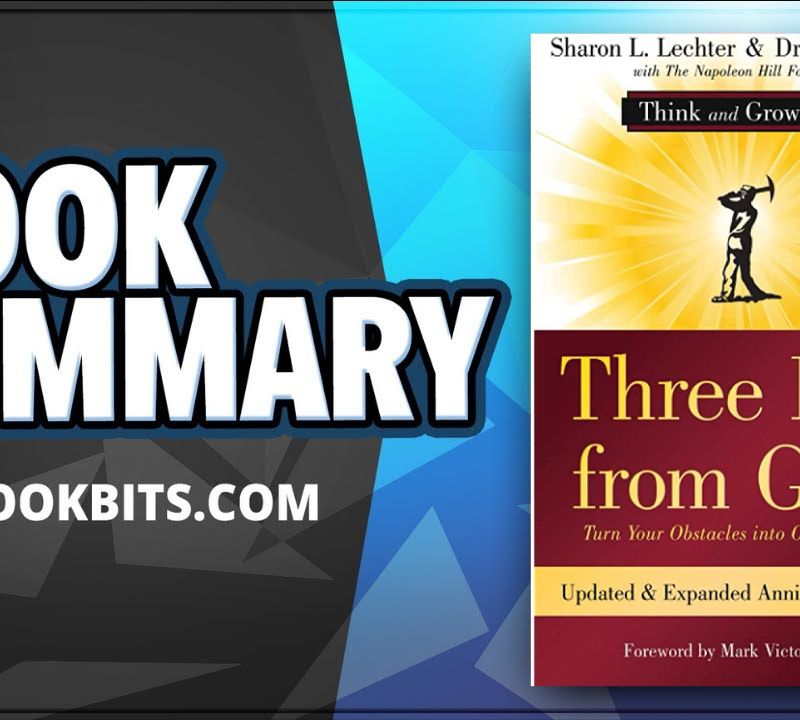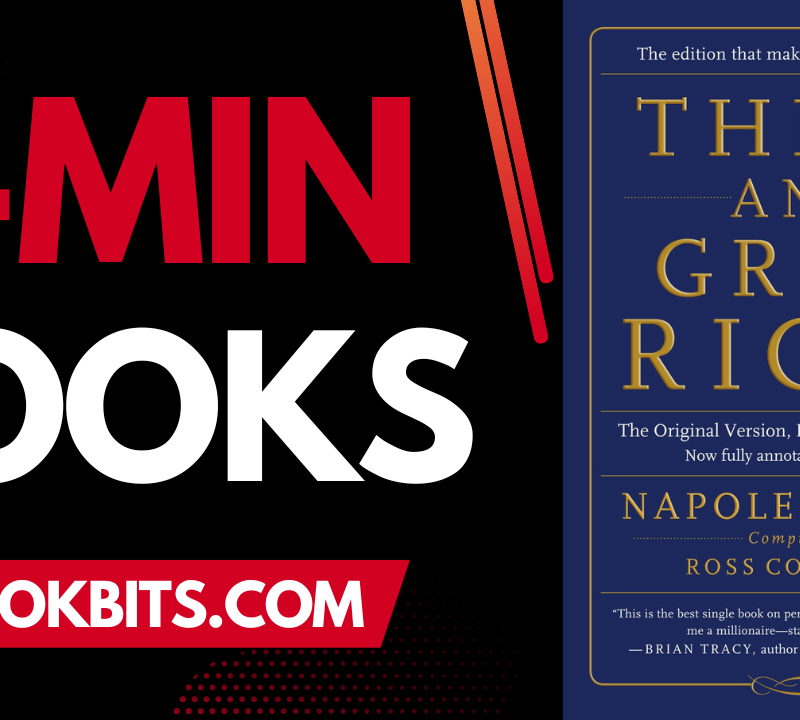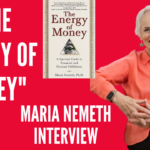★★★Sign up to the Weekly Book Summary Newsletter by CLICKING HERE
★★★Get any FREE audiobook of your choice by CLICKING HERE
- Attract it, create it, manage it and share it.
- Wealth is simply the possession of money or assets, or the process of getting more and keeping more for ourselves.
- Prosperity is the state of “flourishing, thriving or succeeding.”
- Wealth is about money but prosperity is about life, taking in the wider ideas of good fortune, abundance, and wellbeing.
- John Wesley, the great religious reformer, told people to “Make all you can, save all you can, give all you can.
- No man becomes rich unless he enriches others. (Andrew Carnegie)
- Prosperity is best appreciated as a circle in which money is first attracted and created, then managed well and shared to good effort.
- The abilities to attract, create, manage, and share wealth are important to living a contented life, and many of us seek to be better off financially not to amass money for its own sake, but to be in control of our time and spend it in meaningful ways.
- There is still a stigma attached to the pursuit of wealth.
- Wealth really begins in the mind, with your ideas, vision, beliefs, and character.
- The hardest victory is the victory over self. (Aristotle)
- Marsha Sinetar asserts that the key to an abundant life is simply doing work you love. Not only does this lead to excellence in what you produce, which tends to attract more rewards, but aligning your life with your deepest values and talents creates a well of sustainable happiness.
- Prosperity begins with prosperous thoughts, which in turn set up an emotional state that can only attract good into your life.
- Embrace old ideas of simpler living and frugality, showing that controlling your finances is key to a fulfilled life.
- Andrew Carnegie believed that a person who dies rich “dies disgraced.”
- Life constantly tests us to believe that we live in an abundant universe, and if we do believe then remarkable things can happen.
- In times o doubt, think of the acorn. An ancient symbol of abundance, this seed of the mighty oak begins growing only when its tree reached maturity. Prosperity always involves an element of time. Nothing great is achieved overnight, and all things begin small.
- Rectify your heart, and you will rectify your life. Lust, hatred, anger, vanity, pride, covetousness, self-indulgence, self-seeking, obstinacy-all these are poverty and weakness; whereas love, purity, gentleness, meekness, compassion, generosity, self-forgetfulness, and self-renunciation-all these are wealth and power. (James Allen)
- You will only become truly prosperous when you have disciplines your mind. (James Allen)
- Prosperity is always personal, resting squarely on the degree to which you have refined and bettered yourself. (James Allen)
- Whatever your difficulties and pains, they have come fully as a result of your previous thoughts and actions. (James Allen)
- Control your thoughts and your emotions, and you become master of your destiny. (James Allen)
- All that we are is the result of what we have thought. It is founded on our thoughts; it is made up of our thoughts. (Buddha)
- Your world is a reflex of you.
- The route to a better life is not through complaining but through finding ways to deliver service and provide love. (James Allen)
- The secret to your release is to make the best of what you have now. (James Allen)
- Master the self and gain everything. (James Allen)
- If you would walk firmly and securely, and would accomplish any achievement, you must learn to rise above and control all such disturbing and retarding vibrations. You must daily practice the habit of putting your mind at rest, “going into the silence,” as it is commonly called. This is a method of replacing a troubled thought with one of peace, a thought of weakness with one of strength. (James Allen)
- Many people note that their most valuable ideas and their most loving acts are born in moments of stillness. (James Allen)
- Give up that narrow cramped self that seeks to render all things subservient to its own petty interests, and you will enter into the company of the angels, into the very heart and essence of universe love. (James Allen)
- The paradox of real prosperity is that it comes to those who forgot about themselves in providing service to others. (James Allen)
- Anyone can gain wealth if they try hard enough, but prosperity and peace of mind only arrive at the door of people who have first mastered themselves. (James Allen)
- The prosperous do not depend on only once source of income, but grow orchards of “money trees” (Robert Allen)
- Three “Money Mountains” investing, real estate, and marketing. (Robert Allen)
- The main difference between the rich and the poor is this: Poor people see money simply as cash in their hands, to be used as soon as they get it. Rich people, in contrast, understand money primarily as seeds to be planted that will grow into “money trees.” (Robert Allen)
- Poverty is when large efforts produce small results. Wealth is when small efforts produce large results. (Robert Allen)
- Focus on the basic human needs of money, self-esteem, health, god, relationships, and beauty, and you can’t go far wrong. (Robert Allen)
- Sometimes changing just one word, or adding a word, will make all the difference to your ability to sell something. (Robert Allen)
- There is no easier or surer way of attaining wealth than through the habit of paying yourself first through automatic deductions. (David Bach)
- They then realize that the more you earn, the more you spend, and they’re still living from one pay check to the next, caught in an endless cycle of work-spend-work. This is an “unwinnable race”. In such a state, wealth remains just a pipe dream. (David Bach)
- The foundation of all wealth is having savings and adding to them regularly. (David Bach)
- Automatic plus compound interest equals serious wealth. (David Bach)
- Cash is king for all sorts of reason, and the combination of a rainy –day fund plus long-term investments should lighten any heart. (David Bach)
- The foundation of success in life is good health: that is the substratum of fortune; it is also the basis of happiness. A person cannot accumulate a fortune very well when he is sick. (P.T. Barnum)
- You need to have good health in order to be successful. (P.T. Barnum)
- Selecting a vocation on the basis that it was “congenial to [your] tastes” was the surest way to success. (P.T. Barnum)
- Sheer persistence is often the difference between someone who succeeds and someone who fails. (P.T. Barnum)
- When you see an opportunity, seize it and do the work needed to make it succeed. (P.T. Barnum)
- A man acquires a fortune by doing his business thoroughly. (P.T. Barnum)
- A constant hammering on one nail will generally drive it home at last. (P.T. Barnum)
- Be both cautions and bold. (P.T. Barnum)
- Money is good for nothing unless you know the value of it by experience. (P.T. Barnum)
- If you produced something good, make sure that the world knows about it. (P.T. Barnum)
- There’s a sucker born every minute. (P.T. Barnum)
- There is nothing unusual or mysterious in the idea of your pictured desire coming into material evidence. It is the working of a universal, natural law…everything in the whole world, from the hat on your head to the boots on your feet, has its beginning in mind comes into existence in exactly the same manner. All are projected thoughts, solidified. (Genevieve Behrend)
- What we visualize tends to come into being. Use this invisible but logical power to turn any desire into reality. (Genevieve Behrend)
- When you have feelings of lack, you have just forgotten your connection to “Divine abundance.” (Genevieve Behrend)
- In visualizing, or making mental pictures, you are not endeavoring to change the laws of nature. You are fulfilling them. (Genevieve Behrend)
- The image of what you want is strong enough to pull you into action. (Genevieve Behrend)
- Do not fear to be your true self, for everything you want, wants you. (Genevieve Behrend)
- You fulfill your personality by creating something out of nothing. (Genevieve Behrend)
- Each person’s mind is “a center of the Divine Mind.” (Genevieve Behrend)
- The gradual accumulation of the returns earned by corporate business. (John C Bogle)
- If you invest in stocks at all, put money in a fund that automatically owns a little bit of every company listed. Over time, it is a sure and almost worry-free way to accumulate wealth. (John C Bogle)
- Don’t be afraid to be different. On entering any new field or an industry, aim to really shake it up and provide new value. (Richard Branson)
- Being different is not an obstacle, but almost a requirement, in achieving prosperity. (Richard Branson)
- Thinking big and taking calculated risks. He notes, “My interest in life comes from setting myself huge, apparently unachievable, challenges and trying to rise above them.”
- Being less stressed than others by uncertainty.
- Trying to prove people wrong.
- Having the simple belief that “you can do it.” (Richard Branson)
- It adds another dimension to his existence and makes him feel alive. (Richard Branson)
- Don’t invest in stocks, invest in the business behind them. (Warren Buffett)
- Stock-market prices for companies are driven by emotion, not truth, and the truth about a company lies in its operating results rather than its current stock price or its glossy forecasts. (Warren Buffett)
- A quote from Thomas Watson of IBM sums up Buffett’s philosophy: “I’m no genius, I’m smart in spots-but I stay around those spots.
- Invest only in companies whose earnings will surely be higher in the future than they are now. (Warren Buffett)
- When you do buy a stock, buy it for the long haul (“If you aren’t willing to own a stock for ten years, don’t even think about owning it for ten minutes.” (Warren Buffett)
- Buffett notes, the smartest investment move is inactivity. (Warren Buffett)
- The greatest teachers who have ever lived have told us that the law of attraction is the most powerful law in the universe. (Rhonda Byrne)
- You are the one who calls the law of attraction into action, and you do it through your thoughts. (Rhonda Byrne)
- You are a powerful magnet, attracting into your life the equivalent of whatever you are strongly feelings or thinking about. (Rhonda Byrne)
- You can “think your life into existence. (Rhonda Byrne)
- The creative process is the specific way in which you can use the law of attraction to obtain what you want. It involves three steps: Ask the universe – you must be crystal clear about what you want. Believe – act, speak, and think as through you have already received what you have asked for. Receive- feel great that it is coming to you. Feeling good sets up the necessary vibration to manifest the desire. (Rhonda Byrne)
- Instead of thinking that life is a struggle, start believing that things come easily to you. (Rhonda Byrne)
- All that we are is the result of what we have thought. (Buddha)
- The man who dies rich thus dies disgraced. (Andrew Carnegie)
- The wealth creator has a moral obligation to enrich the lives of others in whatever way they can. (Andrew Carnegie)
- In a free society the people of ability and ambition naturally prosper while others lag. (Andrew Carnegie)
- Great wealth ultimately belongs to the society that has helped create it. (Andrew Carnegie)
- Be willing to fail in public, and you have jumped the hurdle holding most people back from getting rich. (Felix Dennis)
- If it flies, floats or fornicates, always rent it-it’s cheaper in the long run. (Felix Dennis)
- You have to see obtaining wealth as a game that you can laugh about, or it will destroy you and your health. There are more important and serious things in life, so you must know when to step back. (Felix Dennis)
- Money, Dennis confesses, “Quite definitely improved my sex life.” This is because money equals power, and power is an aphrodisiac. He quotes author James Baldwin: “Money, it turned out, was exactly like sex. You thought of nothing else if you didn’t have it, and thought of other things if you did. (Felix Dennis)
- Money can also give you something else valuable: control over your time. (Felix Dennis)
- Your attitudes are shaped by your culture. (Jacque Fresco)
- It is really you that is stopping yourself. (Felix Dennis)
- That the moment one commits oneself, providence moves all. (Felix Dennis)
- Yet if you are not willing to fail, you will forever be bound in circumstances that involve little risk. (Felix Dennis)
- Shakespeare wrote about rule your life, life goes quickly, and the clock is ticking.
- The majority of people want three things more than they want money: job security, job satisfaction, and power. If you expressly want to be rich you have immediately separated yourself from the “loyal lieutenants” who fill the world’s workplaces. (Felix Dennis)
- Winston Churchill’s comment “When going through hell, keep going” and the prospect of otherwise being a wage slave drove him on.
- Ideas are cheap; it’s their execution that makes you rich.
- The world is awash with mine with your name on it, waiting to be claimed. (Felix Dennis)
- Financial independence is being free of the fog, fear and fanaticism so many of us feel about money. (Joe Dominguez)
- By living on less, you can actually enjoy life more.
- These days people tend to think of themselves more as “consumers” than “citizens.” (Joe Dominguez)
- We moderns meet most of our needs, wants and desires through money. We buy everything from hope of happiness. We no longer live life. We consume it. (Joe Dominguez)
- The “rat race” involves working to buy luxuries that you don’t have enough time to enjoy. (Joe Dominguez)
- If you are able to reduce your expenditure and “declutter” your life you are likely to experience an increase I satisfaction. (Joe Dominguez)
- Another definition of money. It is something you trade your life energy for. For most people, this “something” is paid work. (Joe Dominguez)
- The thinking goes “I work damn hard, I deserve the best,” so you spend a lot on things that can make up for the misery of working. (Joe Dominguez)
- What do people want more of? Generally, it is more time, not more money. (Joe Dominguez)
- The truly rich are frugal. (Joe Dominguez)
- Frugality does not actually mean going without, but enjoying what you have. (Joe Dominguez)
- He who hesitates saves money.
- Changing your whole direction to take account of an unexpected success requires humility. (Peter Drucker)
- To obtain your desired outer results, you must first master the inner game of wealth. (T. Harv Eker)
- To change the visible, you must change the invisible. (T. Harv Eker)
- Committing to succeed no matter what. (T. Harv Eker)
- Poor or middle-class people would like to be rich, wealthy people are committed to being rich. Between the two mindsets is a world of difference. (T. Harv Eker)
- Earn more based on their results, whether through commissions, royalties, or having their own business. (T. Harv Eker)
- Rich people, in contrast, create things or systems that can earn money for them independently of their time input. (T. Harv Eker)
- Rich people focus on their net worth. Poor people focus on their working income. (T. Harv Eker)
- Poor people are focused on spending their money. Rich people are focused on making it, keeping it and investing it. (T. Harv Eker)
- Another way of saying this is that wealthy people are not smarter than poor people; they just have different and more supportive money habits (T. Harv Eker)
- Yet the way of the universe is that if you manage what you do have well, you will get more. (T. Harv Eker)
- There is nothing holding you back from wealth except your own ignorance or desires to be wealthy. (T. Harv Eker)
- Turn the great energy of your thinking toward ‘plenty’ ideas, and you will have plenty. (Charles Fillmore)
- The anxious thought must be eliminated and the perfect abandon of the child of nature assumed, and when to this attitude you add the realization of unlimited resources, you have fulfilled the divine law of prosperity. (Charles Fillmore)
- Gratitude for what you have is the master key to prosperity. (Charles Fillmore)
- He notes the view of scientists of his time that the “ether” or atmosphere was not nothing, but charged with electricity, magnetism, light rays, X rays, cosmic rays, and other dynamic radiations…it is the source of all life, light, heat, energy, gravitation, attraction, repulsion…it is the interpenetrating essence of everything that exists on the earth. (Charles Fillmore)
- Prosperity cannot happen, Fillmore notes, while you continue to entertain poverty-stricken thoughts. (Charles Fillmore)
- The free market, not government, ensures protection of individual rights and standard of quality, and delivers extraordinary prosperity to those who seek it. (Milton Friedman)
- Prosperity is not just about making money, but about the freedom to live the way you want. (Milton Friedman)
- Education must again revolve around genuine passion and curiosity, so that the vital habit of self-education is developed. (Thomas Friedman)
- The key to real prosperity in business is to work on your enterprise not in it. (Michael Gerber)
- They intoxicate themselves with work so they won’t see how they really are. (Aldous Huxley)
- Great people have a vision of their lives that they practice emulating each and every day. They go to work on their lives, not just in their lives. (Michael Gerber)
- Everyone who becomes wealthy in the modern world knows the power of leverage: using other people’s resources and technology to multiply the effect of what you do. (Mark Victor Hansen)
- No man becomes rich unless he enriches others. (Andrew Carnegie)
- If you want to create wealth, you need leverage. (Mark Victor Hansen)
- What is the greatest form of leverage today? The internet. (Mark Victor Hansen)
- You need a team to obtain your dream. Success is not a solo project. (Mark Victor Hansen)
- Law of prosperity: To get you must always first give.
- There are in fact four distinct types of capital: 1) Human – what people can create 2) Financial – money and money instruments 3) Manufactured capital – infrastructure and products 4) Natural capital – the natural world from which all things come.
- When you know that you want something, and you notice you do not have it, you assume that there is something outside of yourself that is keeping it from you, but that is never true. The only thing that ever prevents you receiving something that you desire is that your habit of thought is different from your desire. (Esther & Jerry Hicks)
- The law of attraction (a universal law that is never contradicted) is that whatever you put your attention on through thought or desire becomes reality. Whenever you are focused on what you don’t have, that situation of not-having will also be your reality. You attract to yourself things or people that are the equivalent of your current state of being, or “vibration.” (Esther & Jerry Hicks)
- You are not in a vibrational state that matches that of your desire. That is the only reason-ever!” Abraham states. What has prevented you from getting what you want is you-your thoughts that do not align with what you want to be and where you want to go. (Esther & Jerry Hicks)
- The key to manifesting your desires is to assume that your desire is already being experienced, that you already have it and are enjoying it. In this way, you set up a level of vibration that can only attract its material equivalent. (Esther & Jerry Hicks)
- That is you think about something for a long time the likelihood of it having a real effect in your life is many times greater that if you think about it briefly. It is also common sense that desires morph into beliefs, and beliefs make us who we are. When you deliberately choose your desires and beliefs, it is logical that you can begin to master your reality. (Esther & Jerry Hicks)
- No one has ever been known to achieve permanent success without doing more than he was paid for. (Napoleon Hill)
- Riches – the real riches of life – increase in exact proportion to the scope and extent of the benefit they bring to those with whom they shared. I know this to be true for I have grown rich by sharing. I have never benefited anyone in any matter whatsoever without having received in return, from one source or another, ten times as much benefit as I have contributed to others. (Napoleon Hill)
- The basic law of prosperity is that to receive, you must first provide something of great value. (Napoleon Hill)
- A clear purpose “changes the biochemistry of the mind.” (Napoleon Hill)
- Applied faith is simply the benefit that “impossibilities” can become reality-from impossible thoughts come impossible things. (Napoleon Hill)
- Hill lists “twelve riches” in life: positive mental attitude; good health; harmony in relationships; freedom from fear; hope of achievement; capacity for faith; willingness to share your blessing; having a “labor of love” or purpose; an open mind on all subjects; self-discipline; capacity to understand people; economic security. (Napoleon Hill)
- To achieve any kind of riches, to “get” you must first give. (Napoleon Hill)
- Without this master plan, you have nothing. (Conrad Hilton)
- Having a dream and thinking big are the basic elements of all great enterprises and fortunes. (Conrad Hilton)
- Most people are too busy earning a living to make any money. (Joe Karbo)
- Mental conditioning is the foundation of wealth; once your goals are programmed in, success comes easily. (Joe Karbo)
- If has been shown that people who do have written goals then to live up to them. (Joe Karbo)
- Without clear, well-defined goals, success is impossible. (Joe Karbo)
- Have to RSVP – read, study, visualize, perform – and with some time and effort you can reap huge dividends. (Joe Karbo)
- Most people suffer from an inadequate self-image, Karbo observes, and yet the way you see yourself is probably the single greatest determinant of your failure or success in life. Fear is ingrained into people from a very early age, and helps to create the person you are. (Joe Karbo)
- Expectations drive results, but expectations can easily be changed. (Joe Karbo)
- The mindset and income patterns of the rich are totally different to those of the poor and middle class. (Robert Kiyosaki)
- The four quadrants are represented by the letters E,S,B and I. E: The Employee, someone who works for the system. S: The Self-employed, whose activities effectively are the system. B: The Business Owner, who owns a part of the system. I: The Investor, who gets wealthy in a hands-off way by seeking a return on money he/she has put into the system. (Robert Kiyosaki)
- Kiyosaki’s rich dad said to him, “People who cannot control their cashflow work for those who can. (Robert Kiyosaki)
- The word “mortgage” is a French one meaning “agreement until death.” (Robert Kiyosaki)
- Lack of knowledge about money. (Robert Kiyosaki)
- Most people put money into what looks good to them visually or emotionally. (Robert Kiyosaki)
- Kiyosaki’s rich dad told him, “Money is a drug” People become addicted to paid employment. They are happy when they get paid, and are miserable and anxious when they don’t. (Robert Kiyosaki)
- Passion builds businesses, not fear. (Robert Kiyosaki)
- Above all, you have to think long term and have a vision. (Robert Kiyosaki)
- Before they can “have,” they have to “be.” (Robert Kiyosaki)
- Change yourself first, and the lifestyle will eventually follows. (Robert Kiyosaki)
- The reason there are few self-made rich people is because few people can tolerate disappointment. Instead of learning to face disappointment, they spend their lives avoiding it. (Robert Kiyosaki)
- Is education, which can cost little but bring you millions. (Robert Kiyosaki)
- Alert investors who focus on the fundamentals and do not get swayed by market sentiments can outperform the professionals. (Peter Lynch)
- Selectively acquire just four or five rental properties (residential or commercial), and you will build an income for life-a monthly cash flow that will generously finance the quality of life you would like to enjoy. (Andrew McLean)
- Buying rental properties is one of the lowest-risk and best-performing forms of investment. (Robert Kiyosaki)
- Investors never buy assets, per se. They buy flows of future income.
- Debts often grow by stealth over many years. (Jerrold Mundis)
- Just for today, one day, do not incur any new debt. (Robert Kiyosaki)
- The root cause of your debt is dysfunctional attitudes you have built up about money, attitudes that no sudden windfall or pay rise is going to change. (Robert Kiyosaki)
- Feelings are not facts. The way people feel about a situation is often wrong, particularly if you have poured your fear and anguish into it. (Robert Kiyosaki)
- Through maximum success demands consistent effort, the realty road to riches requires neither superhuman endeavor nor superintelligence. The chief attributes of successful realty investing are imagination, enterprise and persistence. (William Nickerson)
- Don’t borrow more than you can safely repay from rental returns. Only buy properties that need renovation. Only make improvements that increase the property’s value. Keep selling at a point and reinvesting your profits. (William Nickerson)
- When you invest in housing you buy a prime necessity of existence…Salability may fluctuate with inflation and recession. But your real estate will always retain an intrinsic value which economic forces cannot destroy. (William Nickerson)
- The greatest economic opportunities of tomorrow, always by definition, are in sectors of our economy that may not even exist today. (Paul Pilzer)
- Meditation was the means for discovering your power to “transmute discord into harmony, ignorance into wisdom, fear into love, and lack into abundance.” (John Price)
- More than money itself, what most people need is peace of mind. If you don’t take control of your finances, they will control you (no matter how much you earn.) (Dave Ramsey)
- Ramsey notes three reasons to save: to create an emergency fund; to have cash to buy things so you don’t have to buy them on credit; and to build wealth in the long term. (William Nickerson)
- Everything gained comes at the expense of something else. (Ayn Rand)
- It was about being a mistress of my own time and space. (Anita Roddick)
- Money is in a constant state of flow and circulation, and then more it flows the better. (Sanaya Roman)
- Paradoxically, clarity about your desires increases the range and quality of options for fulfilling them. (Sanaya Roman)
- When you desire something material, spend time contemplating the essence of that thing. (Sanaya Roman)
- The reason that this book’s title contains the phrase, ‘The Money will follow’, is precisely because we must do the work first, invest of ourselves first, seed faithfully in the small, steady, incremental ways of our chosen work first, and then-as a harvest of abundant crops naturally flows the seeding, watering and constant caring process of seeds-the fruits of our efforts result. (Marsha Sinetra)
- Though we can’t control when, the decision to do what we love sooner or later pays off. (Marsha Sinetra)
- We are not born to struggle through life. We are meant to work in ways that suit us, drawing on our natural talents and abilities as a way to express ourselves and contribute to others. (Marsha Sinetra)
- The key is to realize that doing what you love is not a luxury, but a necessity in living a truly prosperous life. (Marsha Sinetra)
- The real price of everything, what everything really costs to the man who wants to acquire it, is the toil and trouble of acquiring it. (Adam Smith)
- The more we learn, the more are, or ought to be, dumbfounded. (Dr Lewis Thomas)
- Whatever you income, always live below your means. (Thomas Stanley)
- I like thinking big. I always have. To me it’s very simple: if you’re going to be thinking anyway, you might as well think big. Most people think small, because most people are afraid of success, afraid of making decisions, afraid of winning. And that gives people like me a great advantage. (Donald Trump)
- Sheer persistence is the difference between success and failure. (Donald Trump)
- If you can make seemingly outrageous demands while keeping a straight face, he claims, you will get bargains. (Donald Trump)
- Scarcity is a lie. Independent of any actual amount of resources, it is an unexamined and false system of assumptions, opinions, and belief from which we view the world as a place where we are I danger of having our needs unmet. (Lynne Twist)
- We should judge the quality of life in a society not by looking at the way the rich in that society live, but by the way the lowest percentile of the people live their lives. (Muhammad Yunus)
- If given the opportunity, the poorest will do what it takes to become prosperous. (Muhammad Yunus)
- We believe that poverty does not belong in a civilized human society. It belongs in museums. (Muhammad Yunus)
- Gratitude is the key to an abundant life, because it puts you in a state of mind that attracts even more of what you are grateful for. Love, appreciation, and thanks are the essence of prosperity. It is right to become a giver, but you must also learn to be a good receiver.
- The half-hearted achieve half-success.
To buy the book, click the link in the image below to purchase from Amazon.














